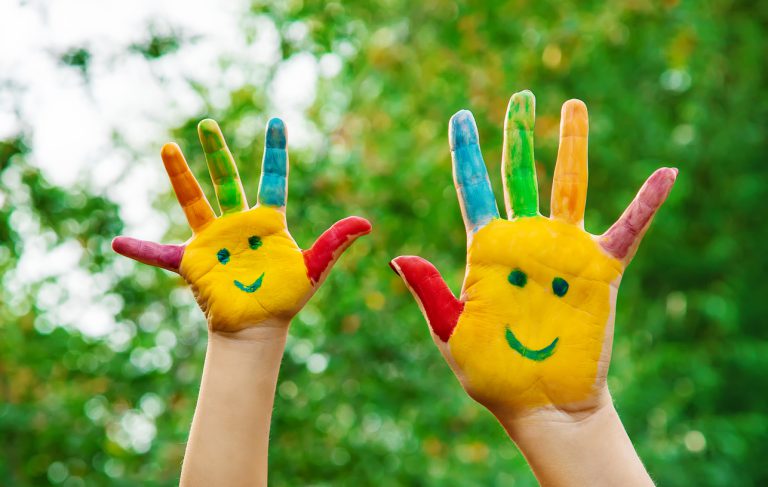Article originally published in the Spring 2020 Issue of Kansas Child Magazine.
Caregivers play an integral role in assisting children achieve healthy social-emotional development. Social-emotional development is the ability of children to recognize and understand their own feelings and the feelings of others, manage and express strong feelings, regulate their own behavior, empathize with others, as well as establish and maintain relationships. Babies, toddlers, and children rely on nurturing relationships with adults to assist them in learning how to control or respond appropriately to their emotions.
A beneficial tool that can be utilized to promote this relationship is the serve-and-return mechanism, which occurs when a caregiver attends to a child and provides the appropriate reciprocal interactions. By pro- viding nurturing relationships, caregivers facilitate the opportunity for children to develop neural connections between the prefrontal cortex and other regions of the brain. This allows the child to develop more efficient executive function skills — such as working memory, self-control, and flexible thinking, all of which are needed to succeed academically, personally, and professionally.
The foundational effect that early adult caregiver relationships have on the social-emotional development of a child emphasizes the need for collaboration between child care providers and the families of the children in their care.
Both at the state and national levels, policymakers are emphasizing the importance of social-emotional development in early care and education settings. The Kansas Early Learning Standards, published in 2012 by the Kansas Department of Education, include a section on social-emotional development to assist early care and education practitioners in their efforts to prepare the children in their care for kindergarten (For more information: bit.ly/2vrTWKa).
In 2016, the U.S. Department of Health and Human Services along with the U.S Department of Education, released a policy statement that addresses family engagement in early childhood systems. The statement emphasized that when families and child care providers support each other in their roles of developing a child, the child experiences better developmental outcomes (For more information: bit.ly/36zbReD).
Supporting Social-Emotional Development in your Program
Below are some resources, practices and policies that can be incorporated into your programming to support social-emotional learning.
- Create a predictable and nurturing environment, establish trusting relationships, intentionally support children in developing social skills, recognize and talk about emotions, encourage positive behaviors and use positive discipline practices (For specific steps for each age category visit: bit.ly/37yYtsh and bit.ly/2tU8Kkh)
- Create a policy to screen for social-emotional concerns using a validated screener, such as the Ages and Stages Questionnaire Social-Emotional: 2™ (bit. ly/2uzIiwi)
- Know community referral resources in case the screener suggests a concern, for example, early intervention services or early childhood mental health providers.
- Attend continuing education opportunities that present topics on social-emotional development to learn up-to-date information from experts in the field.
Supporting Families with Their Child’s Social-Emotional Development
Outlined below are some resources that families can utilize to support social-emotional learning.
- Talk with families about social-emotional milestones (bit.ly/2GrCCY3) and about downloading the CDC milestone tracking app (bit.ly/2RT6Jgj)
- Direct families to the Help Me Grow Kansas website for information on social-emotional development and activities (www.helpmegrowks.org/family)
- Connect with 24-hour, confidential and free early childhood resources and professionals by calling 1-800-CHILDREN
-

Erica Figueroa
Project Coordinator on the Early Childhood Comprehensive Systems Impact Project
Erica serves as the Project Coordinator on the Early Childhood Comprehensive Systems (ECCS) Impact Project and supports other Title V connected initiatives including Help Me Grow, Kansas Connecting Communities (KCC) and Lifting Young Families Towards Excellence (LYFTE). Mrs. Figueroa graduated with a Bachelor of Science Degree from Duke University. She majored in Psychology and minored in Global Health. During her time at Duke, she worked in an infant cognitive development lab, examining the process of language development as a child matures. She is currently pursuing a Master of Counseling Psychology at the University of Kansas. She is also a certified trainer for the Ages and Stages Questionnaire® (ASQ) and actively provides trainings across the state of Kansas.






